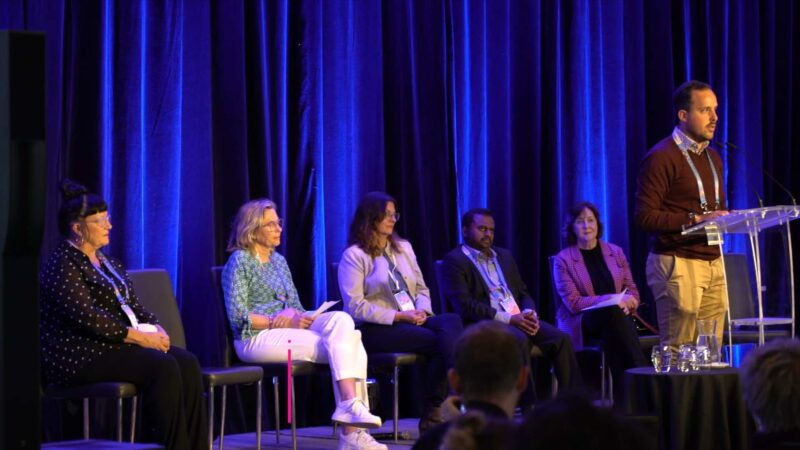FULLY FUNDED TERTIARY QUALIFICATION LAUNCHES TO ADDRESS PERINATAL MENTAL HEALTH CLINICIAN SHORTAGE IN AUSTRALIAN-FIRST Tertiary qualification launched by Gidget Foundation and Federation University.
With Arabella Gibson, CEO
Gidget Foundation Australia
SEGMENT
Filmed in North Sydney | January 2025
Demand for perinatal mental health services is continuing to surge year-on-year. In fact, perinatal mental health organisation, Gidget Foundation Australia (GFA), has supported 30% more clients in FY2024 than in FY2023, up by 214% since FY2021.
Perinatal depression and anxiety (PNDA) impacts 100,000 Australians each year, equating to one in five mums and one in ten dads, with PNDA costing Australia $877 million annually. To address the nationwide shortage of specialist perinatal mental health clinicians, Gidget Foundation Australia has partnered with Federation University to launch the Graduate Diploma in Perinatal Mental Health.
Australian Health Journal met with Arabella Gibson, CEO Gidget Foundation Australia following the announcement to hear about the Gidget mission and the new initiative to address the perinatal mental health clinician shortage.
The new Graduate Diploma in Perinatal Mental Health creates a unique offering in the industry, providing comprehensive ‘on the job’ training, weekly supervision for clinicians, academic modules and a paid placement opportunity as well as ongoing employment through Gidget Foundation Australia’s face-to-face or telehealth services.
The new partnership, create an Australian-first offering of a fully supported tertiary qualification. Gidget Foundation Australia and Federation University have engaged in the unique co-design and co-delivery of the qualification, with both organisations developing and delivering practical and theoretical course content.
Ms Gibson says the Gidget Foundation, with Federation University, is committed to ensuring robust clinical standards are achieved through providing exceptional education for clinicians working in the perinatal space.
“We’ve seen demand for perinatal depression and anxiety support continue to rise, our clinicians supported 30% more clients in FY2024 than in FY2023. It’s essential we have enough qualified clinicians to meet this growing demand to address the critical needs of the individuals impacted.
“Equity, access, and affordability can be a barrier for allied health professionals to further extend their professional knowledge and skills. The Graduate Diploma in Perinatal Mental Health enables health professionals to upskill in perinatal and infant mental health and creates an accessible pathway to enhance knowledge and experience across the sector; whilst benefitting the health professional, clients, and the wider community.”, says Ms Gibson.
The first cohort of the new Graduate Diploma in Perinatal Mental Health will graduate in July 2025 and applications opened in November 2024 for the February 2025 intake.
You Might also like
-
Study on digital tool for pharmacists in aged care
In March 2022, the Australia government announced $350 million of funding over 4 years to employ on-site pharmacists in residential aged care, starting July 2023. In April 2023, the government made changes to the proposed on-site pharmacists, where the new program will now be delivered by and through community pharmacies. Regardless of how the model will be implemented, the goal remains the same – to improve quality use of medicines and medicines safety for aged care residents.
-
Message from former Australian Health Minister Hon Greg Hunt
The Honourable Greg Hunt served in the Australian Government as Minster for Health and Aged Care from 2017, previously as Industry, Innovation and Science Minister and before that the Environment Minister.
Elected as the Member for Flinders in 2001, Greg announced his retirement from politics late 2021 and in 2022, ahead of the Federal Election, having completed 20 years as a public servant.
Australian Health Journal recently caught up with Greg in a relaxed interview at his home in the Mornington Peninsula, Victoria to hear how a 9 month sabbatical has allowed him to focus on family, fitness and future. This has even included some “brutal spin cycle classes!”.
-
Bionic eye trial shows improvements in functional vision for retinitis pigmentosa
Results of the first clinical trial of Australia’s ‘second generation’ bionic eye have demonstrated ‘substantial improvement’ in four participants’ functional vision, daily activities and quality of life over a period of more than two and a half years.
Led by the Centre for Eye Research Australia, Bionics Institute, University of Melbourne and Royal Victorian Eye and Ear Hospital, the trial findings add to interim results which showed that the second-generation bionic eye developed by Australian company Bionic Vision Technologies provided rapid improvements for four patients with blindness caused the genetic eye condition retinitis pigmentosa.



